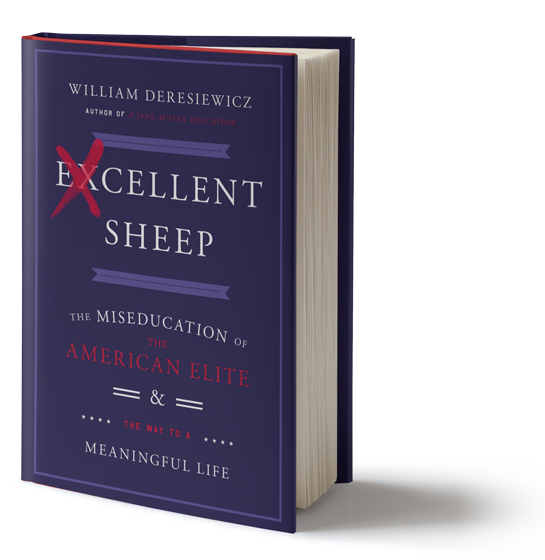William Deresiewicz is one of America’s best young public intellectuals. He has written a passionate, deeply informed, and searing critique of the way we are educating our young. Whether you agree or disagree—and I found myself doing both—you must read this book. It should spark a great debate on America’s campuses and beyond.
—Fareed Zakaria
William Deresiewicz’s Excellent Sheep is a searing and important critique of our morally bankrupt educational system. He argues, correctly, that colleges and universities, awash in corporate money and intent on churning out corporate managers and conformists rather than scholars, have betrayed not only their mission, but the students they purport to teach and by extension the wider society. Deresiewicz’s book is not so much a call for reform as for revolt. This revolt cannot come soon enough.
—Chris Hedges
In Excellent Sheep, William Deresiewicz sets out to unnerve the current and future college students of America (and their parents). He succeeds brilliantly, with an indictment of elite education that should launch a thousand conversations. Read this book to remember what learning should be, and then pass it along to the next sheep who should leave the flock behind.
—Emily Bazelon, author of Sticks and Stones: Defeating the Culture of Bullying and Rediscovering the Power of Character and Empathy
Excellent Sheep challenges parents to break from the herd mentality, to question what we really want from our children, who we really want them to be. The book filled me with both hope that there could be a more authentic, creative way to raise a new generation of thinkers—and with the courage to try to find it.
—Peggy Orenstein, author of Cinderella Ate My Daughter
Excellent Sheep is a withering analysis of the transactional spirit that rules American education and American life, and an inspiring example of a better ideal. A true teacher speaks here. He has my admiration and my gratitude.
—Leon Wieseltier
William Deresiewicz’s book is in and of itself a higher education, and to read it is to learn what’s a college for. The author is an inspired teacher, and his lesson is of a truth sorely needing to be told.
—Lewis Lapham
“Excellent Sheep is likely to make…a lasting mark for three reasons. One, Mr. Deresiewicz spent twenty-four years in the Ivy League, graduating from Columbia and teaching for a decade at Yale….He brings the gory details. Two, the author is a striker, to put it in soccer terms. He’s a vivid writer, a literary critic whose headers tend to land in the back corner of the net. Three, his indictment arrives on wheels: He takes aim at just about the entirety of upper-middle-class life in America….Mr. Deresiewicz’s book is packed full of what he wants more of in American life: passionate weirdness.”
—Dwight Garner, The New York Times
Parental alert: The escalating race to get kids into elite schools is churning out new armies of “bionic hamsters,” soulless super-students with a single-minded lust for credentials. This refreshingly barbed indictment of America’s prestige-education addiction reveals what college students are really getting out of all that work, all that struggle, all that stress—and all those tuition loans.
—More
Entwined with his j’accuse is an impassioned, idealistic plea to reclaim the undergraduate years as a journey of self-discovery guided by engaged professors who challenge students to think for themselves instead of following the flock to Wall Street. Deresiewicz’s critique of America’s most celebrated schools as temples of mercenary mediocrity is lucid, sharp-edged, and searching…He poses vital questions about what college teaches—and why.
—Publisher’s Weekly
In this probing indictment, a former Yale professor accuses America’s top universities of turning young people into tunnel-visioned careerists, adept at padding their résumés and filling their bank accounts but unprepared to confront life’s most important questions. Craven conformity, not free-spirited independence, is what Deresiewicz sees students learning in a campus world populated by hyperspecialized professors who pursue arcane research agendas and leave the teaching of undergraduates to adjuncts and TAs. The time has come, Deresiewicz asserts, for college professors and administrators to make students their first priority by giving them a challenging liberal-arts education. Grounded in the humanities, such an education would give students real intellectual and imaginative breadth, not just a professional credential. Besides pressing for this curricular and pedagogical realignment, Deresiewicz calls for radical reform of admissions policies, so reversing the trends that make the university an enforcer of caste hierarchies. Deresiewicz’s controversial full agenda indeed means an end to rule by meritocracy and a beginning of fairness for the working class. An urgent summons to a long-overdue debate over what universities do and how they do it.
—Booklist (starred review)





